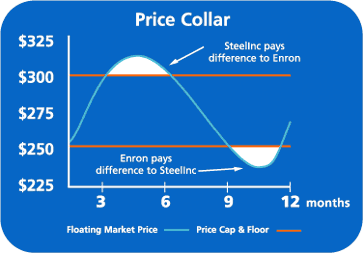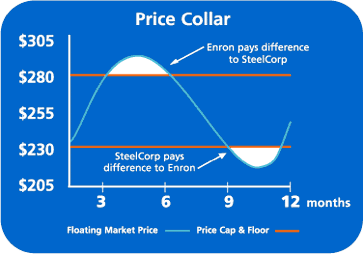 |
Collars provide steel producers and consumers with price protection by keeping their prices within a certain predefined range. No cash premium is involved for zero-premium collars.
For producers, collars offer floor protection on commodity sales prices. In exchange, the producer gives up some potential benefits from favorable price moves by selling a cap. If index prices move within the specified collar, the producer will sell steel at prevailing market prices and no payments are made. However, if the index price falls below the collar's lower limit, then the producer will be reimbursed for the shortfall. Correspondingly, if the index price for steel exceeds the collar's upper limit, the producer must pay the difference.
For consumers, collars offer cap protection on commodity purchase prices. In exchange, the consumer gives up some potential to benefit from favorable price moves by selling a floor. If index prices move within the specified range created by the collar, no payments are made under the collar and the consumer will buy steel at prevailing market prices. However, if the index price for steel exceeds the collar's upper limit, the consumer will be reimbursed for the difference. Correspondingly, if the index price for steel falls below the collar's lower limit, the consumer must pay the difference.
In many ways, zero-premium collars are similar to swaps, but they allow for greater flexibility.
Collar: Producer Application
SteelInc, a mini-mill producer of hot-rolled steel with an annual production of 5 million tons, wants to protect 10 percent of its production from falling steel prices. However, SteelInc does not want to pay a cash premium for this protection. SteelInc also requires more flexibility than a standard swap can provide.
In order to protect itself against a significant drop in steel prices, SteelInc enters into a one-year, zero-premium collar agreement with Enron for 10 percent of its production (500,000 tons). Under this agreement, SteelInc is protected with a floor price of $250/short ton. In exchange for this protection, SteelInc agrees to limit its upside potential with a price cap of $300/short ton.

During the Life of the Collar
- SteelInc continues to sell steel to its normal customers at index prices.
- If index prices move outside the range of the collar, then SteelInc and Enron exchange payments on a monthly basis equal to the difference between the index price and the appropriate collar price during the agreement.
- For example, if the index price of hot-rolled steel falls to $240/short ton for a given month, then Enron will pay $10/short ton to SteelInc. Likewise, if the index price of hot-rolled steel rises to $310/short ton for a given month, then SteelInc will pay Enron $10/short ton.
- SteelInc has "paid" to protect a portion of its production by foregoing some of its upside price potential. In exchange, SteelInc has received the benefits associated with limiting its downside price risk.
Collar: Consumer Application
SteelCorp is a processor of hot-rolled steel. SteelCorp would like to stabilize the price of its primary input, hot-rolled steel, but it is fearful that hot-rolled steel prices will increase, making it difficult to sell its processed steel at competitive prices. SteelCorp cannot afford to pay a premium for this protection, as that would further increase the price of its products.
In response to these considerations, SteelCorp enters into a one-year, zero-premium collar agreement with Enron on the projected volume to be sold to SteelCorp's customers each month. Under this agreement, SteelCorp is protected by a cap price of $280/short ton. In exchange for this protection, SteelCorp agrees to limit its downside participation in the market by selling a price floor to Enron at $230/short ton.

During the Life of the Collar
- SteelCorp buys steel from its normal supplier(s) at index prices.
- If index prices move outside the range of the collar, then SteelCorp and Enron exchange payments on a monthly basis equal to the difference between the index price and the collar price during the agreement.
- For example, if the index price of hot-rolled steel rises to $290/short ton, Enron will pay $10/short ton to SteelCorp. Conversely, if the index price drops to $220/short ton, SteelCorp will pay $10/short ton to Enron.
- SteelCorp has protected itself from rising hot-rolled steel prices and avoided paying any fees for the protection by giving up any potential benefit from a price drop below $230/short ton.
on to Inventory Management
back to Products and Services

top of page

|





